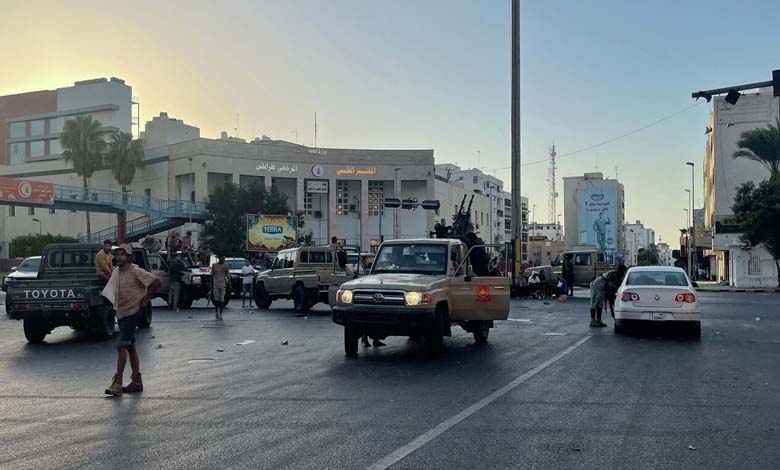UN and Regional Efforts to Contain Tensions in Tripoli

Stephanie Khoury calls for urgent security arrangements, including the return of forces to their barracks, as foreign ministers from Tunisia, Algeria, and Egypt meet in Cairo to discuss regional and international efforts to support dialogue between Libyan factions.
-
Gheniwa’s Blood Strangles Dbeibah… Tripoli’s Nero Burns in His Own Fire
-
Protests in Tripoli Call for Dbeibah and His Government to Step Down
Stephanie Khoury, the Deputy Special Representative of the UN Secretary-General, urged immediate security measures during an expanded meeting held on Thursday with Libyan stakeholders. These measures include the return of armed forces to their barracks, following recent clashes in Tripoli.
This comes as Tunisia and Algeria prepare to participate in a tripartite consultative meeting in Cairo on Saturday, aimed at addressing the latest developments in Libya.
-
Militia Arms Chaos Reignites Violence Spiral in Tripoli
-
Armed Clashes in Tripoli Reveal Fragility of Security Situation
The meeting brought together representatives from Souq Al-Jumaa, members of the local social council, municipal councils from the four districts, the Change for Libya movement, the National Council for Civil Liberties and Human Rights, the National Anti-Corruption Authority, along with civil society organizations and prominent local figures.
Discussions focused on the impact of recent clashes in Tripoli, which endangered civilians, damaged infrastructure, and disrupted public services. Participants expressed deep concern over the growing military mobilization, particularly by forces entering from outside the capital, and called for an immediate de-escalation.
-
Heavy Clashes in Tripoli After the Killing of a Militia Leader Affiliated with the Presidential Council
-
Washington Denies Training Armed Groups in Tripoli under Agreement with Dbeibeh
Khoury highlighted the UN Mission’s efforts to secure a lasting truce, emphasizing the need for clear security arrangements, including the withdrawal of forces from residential areas, to restore stability and halt the cycle of violence in Tripoli.
On the political front, participants stressed the importance of combating corruption, guaranteeing freedom of expression, and supporting peaceful protests. They voiced support for the UN advisory committee’s proposals for a comprehensive political roadmap, and called for addressing the underlying causes of division fueling the ongoing conflict.
-
Clashes Between Militias in Tripoli Mar Eid Atmosphere
-
Complications Hindering the Evacuation of Militias from Tripoli
In parallel, Tunisia and Algeria are set to participate on Saturday in the tripartite consultative meeting in Cairo, which will review the situation in Libya and explore joint efforts to promote intra-Libyan dialogue.
According to Tunisia’s Ministry of Foreign Affairs, Minister Mohamed Ali Nafti will attend the meeting alongside his Egyptian counterpart Badr Abdel Aty and Algerian counterpart Ahmed Attaf. Tunisia’s participation is grounded in the historic and fraternal ties with Libya, and its consistent support for the Libyan people’s aspirations for peace, stability, and prosperity.
-
Analyst Reveals the Beneficiary Behind the Clashes in Tripoli
-
The Libyan Scene is Turbulent… What Comes after the Clashes in Tripoli?
The Tunisian ministry stated that the meeting will discuss recent Libyan developments and enhance the role of neighboring countries and the UN Mission in Libya in facilitating dialogue and fostering a consensual political solution, under UN sponsorship.
The Algerian Foreign Ministry also confirmed that Ahmed Attaf had traveled to Cairo on behalf of President Abdelmadjid Tebboune to attend the ministerial meeting of the tripartite mechanism for Libya’s neighboring states, a format which had not convened since 2019.
-
Tripoli Ignites: How Did Hamza’s Arrest Lead to a War Between the “Deterrence” and “Brigade 444”?
-
Libya.. Renewed clashes in Tripoli
The meeting aims to revitalize this tripartite consultation mechanism and unify efforts among Tunisia, Algeria, and Egypt to help resolve divisions and reach a comprehensive political settlement to the Libyan crisis.
On 12 June 2019, the foreign ministers of Egypt, Tunisia, and Algeria had issued a joint statement rejecting all forms of foreign interference in Libya’s internal affairs.
The Cairo meeting follows a recent surge in armed clashes and political protests in Tripoli, involving confrontations between the Government of National Unity and rival armed factions, as well as public demonstrations both opposing and supporting the government.
-
Disputes rock Libyan State Council… and new clashes in Tripoli
-
Bashagha Forces withdraw from Tripoli area after US pressure
Meanwhile, the UN Mission in Libya continues its work to guide the country toward national elections, seen as the only viable solution to the longstanding conflict between the two rival governments — the eastern-based administration led by Osama Hammad, and the western-based Government of National Unity led by Abdulhamid Dbeibah.
Libyans hope the long-overdue elections will finally end the political and military turmoil and conclude the transitional phases that have persisted since the fall of Muammar Gaddafi’s regime (1969–2011).












